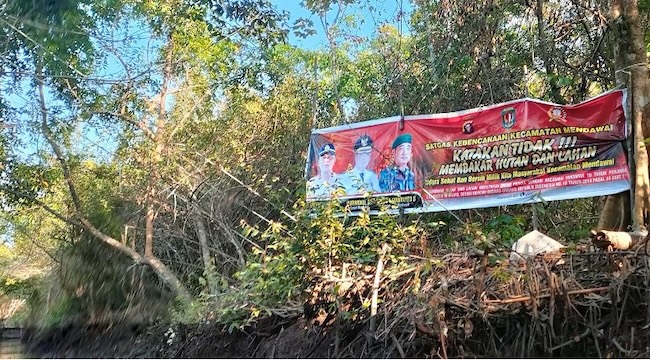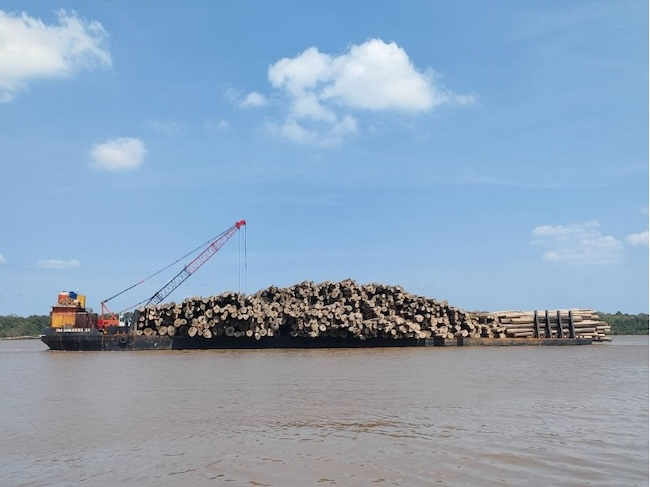The Mendawai people are aware of the risks forest fires bring, but some continue to use fire as a tool as it is the only affordable way they know to make a living
Hafiz Awlia Ramadhan
Baca versi Bahasa Indonesia
One morning in September 2023, my breakfast was interrupted suddenly by news of the arrest of a villager suspected of starting a fire in the nearby forest. A few days later I met the Mendawai chief of police, who told me that the suspect was discovered by a patrol team near a newly burnt area. The officers chased him through a peat swamp, while five other suspects escaped. Later that night, family members of the suspect come to the police station, begging for the case to be resolved out of court. The chief of police explained that there was nothing he could do, as forest fires are a major concern for the national government.
During the dry season, patrol activity in Mendawai intensifies. This is intended to prevent illegal activities in fire prone regions and to educate the public about fire-related regulations. Law enforcement officers install banners, go door-to-door, and post warnings on social media. By constantly reminding people about forest fire risk and the legal consequences of lighting fires, the authorities hoped that the local communities will come to fear using fire as a tool for their livelihoods.
I had the opportunity to visit Mendawai sub-district from August to November 2023, to document narratives about forest fires. While I was there, news about the villager’s arrest became a hot topic for a couple days. But I wonder whether this arrest, the erecting of banners, and the disappearance of agricultural fire use, can be considered successes. Surely fear is not the only way to solve forest fire issues? To answer this question, it is important to understand the complex balance that must be found between local communities’ livelihoods and environmental awareness.
During my time in Mendawai it was clear that law enforcement officials are blind to the complexity of economic problems these local communities face. These became acute in the wake of the collapse of illegal logging at early 2000s with the reform of timber harvesting regulations introduced by the government of former President Suslio Bambang Yudhoyono, which firmly eradicated many illegal somel (sawmills) and bansaw (bandsaws). This equipment was usually owned by local communities which supplied timber companies with logs. Though the majority of people claim to be afraid of forest fires’ impacts, whether legally or ecologically, there are still some farmers, fisherman and smallholders who use fire as a tool. This is not because they do not understand the risk of doing so, but quite simply because it is the only way they know how to make a living. Without government assistance to find ways to cultivate their land without burning, some have no choice but to burn their fields each year.
For centuries, the local Dayak communities have been using fire in their farming practices. Fire is used to clear the shrubs from the fields, not only it is faster but also cheaper. The ashes left from burning shrubs and twigs are believed to nourish the fields and also ward off potential pests. When the time to burn the field has come, usually by observing wind direction or another natural signs, the local communities will work together to burn and watch the direction of the fire so that it can be controlled and not transform into a wildfire. It was then after 2015 forest fire catastrophe that the use of fire on farming activities faced significant decrease in stricter law enforcement.
Who is to blame?
Forest fires have become a problem for Indonesians, especially during dry seasons impacted by the El Niño cycle. This problem is also felt by neighbouring countries such as Malaysia and Singapore where smoke haze from the fires results in health hazards and warnings. The severe 2015 forest fires promoted an unprecedented increase in anti-fire regulations. Various laws were issued to control and restrict local farmers who are almost always accused of causing the forest fires.
‘Katakan Tidak!!! Membakar Hutan dan Lahan’ (Say no!!! To burning the forest and soil) read the banners displayed in villages and along roadsides. They also warn about the legal consequences of burning, including up to 15 years imprisonment and huge fines. These threats stick in the minds of locals: ‘Obviously we are scared. How can we get the Rp 15 billion (A$1.4 million) to pay the fine?’

Fire for agricultural purposes has been used for generations by local Dayak peoples. As the politics around forest fires has accelerated, this has made them an easy scapegoat. This includes blaming them for the failure of the primary public education program, which promotes the message ‘No fire No chemicals’ on farmland (Tanpa Membakar Tanpa Kimia). Local Dayak communities are seen, not only by the government but also by other communities, 'orang sini susah berkembangnya, tidak mau usaha' (These local communities is really hard to developed, they did not want to strive for it) such utterance could be seen as how the local communities perceived lacking the ability to adapt to changing times and regulations. In reality this understanding is not only degrading but also fails to understand the wider context and hardships experienced within these local communities’, notably the difficulty of making a living.
Coercing environmental awareness
Prior to the 2015 fires, much had already been done by Balai Taman Nasional, WWF, and private sectors, to end the use of fire for agricultural purposes. In 2004 the Sebangau National Park was established in order to restrict land use and access and thereby prevent fires. Other initiatives included working with former illegal loggers. For example, state and non-state entities such as PT RMU (Rimba Makmur Utama), WWF, and BRGM (Peatland and Mangrove Restoration Agency) provide educational programs for local people in order to improve their environmental awareness and dissuade them from using fire and chemical compounds in agricultural production. These small-scale initiatives pale into insignificance, however, when faced with a dry season accompanied by severe fire threats.
After 2015, law enforcement in Mendawai was stepped up and more police arrived in the region. Quite quickly, news emerged of the arrests of people suspected of starting forest fires. This was followed by the installation of banners and dissemination of public education campaigns. The head of a village in Mendawai sub-district told me that it is now customary for village heads to be summoned by the chief of police during dry season. The local people began to feel under pressure whenever they went to cultivate or simply visit their farmland, fearful that they could be suspected of starting fires.
For the Mendawai communities, it is not merely about obeying the laws but also a question of what they will gain if they obey such laws. Land, forest, peat and so on, have long been viewed as having economic value. Since the forest fire regulations and anti-fire policies were introduced their efforts to utilise the economic potential of their land has been hindered. According to the locals, none of the initiatives undertaken so far, including the national parks or farms without fire and chemicals initiative, have had an economic benefit for the community. Instead such measures are seen as hindering development and adding to their costs.
Post-logging industry lag
In 2003-2004 the logging industry in the region began to slow and Mendawai residents were forced to leave the region to find work elsewhere. For the previous 30 years, this industry was the main source of income for people in Mendawai. The vast potential of timber in the region even attracted people from outside Borneo. Some of the ex-loggers recall that they could earn as much in a day from logging as they would earn in a month in other employment like farming or fishing. One day’s work as a logger could earn them as much as Rp 1 million (A$94) in the 1990s, while working as a farmer it is needed one cycle of planting and harvesting (4-6 month) to get this amount of money. During this period, farmland was cultivated primarily by the elderly, since they lacked the physical strength necessary to work in the timber business.

After the slowdown in the logging industry, some of those who chose to stay in Mendawai began to cultivate rubber trees, nut rubber prices began to stagnate and could not keep up with the cost of living. The increase in the cost of living after the 1998 Asian economic crisis exerted enormous pressure on small farmers. As a result, most of them had to abandon small-scale agriculture and seek a more stable source of income, such as working on palm plantations.
Others have been even more creative in finding alternative livelihoods. Since the police can’t arrest anybody without physical evidence or catching them red-handed, some people, either farmers or fishermen, will burn dry weeds and then flee, the police and some of the residents told me that these hit and run methods was the main cause of the uncontrollable spreading of the forest fires. Arguably, the local communities best understand the impacts of forest fires—not only legally, but also in terms of health and the environment. But the lack of alternative sources of income leave them with little choice. People find it difficult to fulfil basic household needs, and as a consequence they are increasingly desperate. Fire is their only solution.
Testing the blaze
For the Mendawai local communities, economic sustainability and obedience to law are two separate things. Their desperation in using fire for economic purposes should not be interpreted as disobedience to the law. During my visit, I was hanging out with the locals playing gaple (dominoes). They were members of the village fire prevention unit. None of them seemed to be bothered with the forest fire burning in the neighbouring village. I expected they would have shown more concern, but for them it appeared to be just another Monday. As long as the fire did not spread to their village, life was good enough.
I spoke with a farmer, Pak Dublin (a pseudonym), who is very active in educating other farmers about how to use chemicals instead of fire for farming. He told me that locals were not enthusiastic about farming without fire because it was more expensive than using the traditional methods. Nor is there government assistance for local farmers to become self-sufficient by giving them proper equipment, including tools and tractors. This aid is needed in order for them to cultivate the barren land so that it can be converted into more productive land, which still needs at least two years of cultivation, before it can produce a good harvest. The banning of fire for agricultural purposes and lack of win-win solutions for the local farmers greatly affects their ability to earn a living. In the past, they never had to buy rice for their daily needs. Nowadays, they have to. For the local people of Mendawai, their frustrations are only growing. As a farmer (USE NAME) admitted to me ‘I will start using fire again in next year's dry season. I want to test those police just to see how far they will go to regulate fire. We will see how they react.’
Hafiz Awlia Ramadhan (H.Ramadhan@cifor-icraf.org) has been working as a researcher for 10 years focusing on livelihood, social forestry, and stakeholder engagement issues. He is currently working with CIFOR-ICRAF Indonesia as a Research Assistant for Kelola Project.












